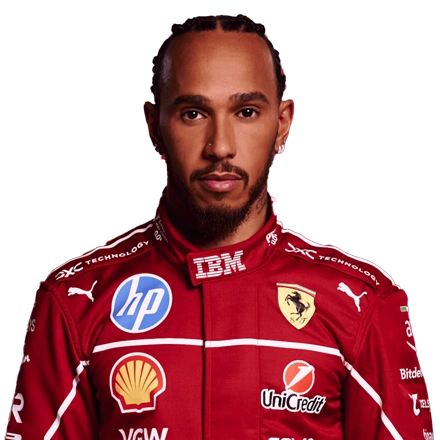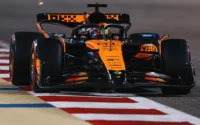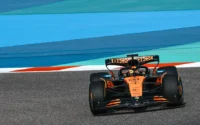Lewis Hamilton is a British driver who currently races for the Ferrari team and is widely regarded as one of the greatest drivers in F1 history. He has achieved an unprecedented level of success, equalling Michael Schumacher’s record of seven World Championships and holds records for most wins, pole positions, and podium finishes, among other records.
| Nationality | British |
|---|---|
| Born | Lewis Carl Davidson Hamilton 7 January 1985 Stevenage, Hertfordshire, England |
| Height | 5 ft 8 in / 1.74m |
| Weight | 73kg |
Hamilton’s journey to F1 began early in karting. He won multiple races and championships, which ultimately led to his signing to the McLaren Young Driver Programme in 1998. Under McLaren’s guidance, Hamilton eventually made his F1 debut with the team in 2007.
2007: McLaren Debut
Partnering with two-time world champion Fernando Alonso, his debut season was remarkable, securing his first pole position in Canada, the sixth race of the season, and his first race win a week later at the 2007 US Grand Prix. Hamilton narrowly missed winning the championship title by a single point to the Ferrari of Kimi Raikkonen finishing third overall. His debut season remains one of the most successful in F1 history setting a record for the most consecutive podium finishes by a rookie.
2008: First World Championship
In his second season with McLaren, Hamilton became the youngest Formula One World Champion at the time, winning the 2008 title in dramatic fashion. He clinched the championship in the final race of the season in Brazil, overtaking a struggling Timo Glock on the last lap to finish 5th, enough points needed to secure the title. That season, Hamilton won five races, including memorable victories at Monaco and Silverstone, where he often outperformed more experienced drivers to claim his first of many world titles.
2009–2012: McLaren‘s Decline
After his 2008 triumph, McLaren’s performance declined slightly in 2009 due to the team’s struggles with the new regulations. Despite this, Hamilton secured two wins in Hungary and Singapore but could only manage 5th place in the drivers’ standings.
The 2010 season saw a resurgence for the team with Hamilton fighting for the title until the final race, finishing 4th overall after claiming three victories. In 2011, McLaren’s car improved, and Hamilton managed three wins, but off-track distractions and on-track collisions hurt his title challenge. He ended the season in 5th place.
The 2012 season was Hamilton’s last with McLaren, but was let down by reliability issues. Despite four race wins, including a standout win at Austin’s inaugural 2012 US Grand Prix, Hamilton finished fourth in the championship.
2013: Move to Mercedes
In 2013, Hamilton made the bold move to Mercedes, a decision that was questioned at the time due to the team’s mid-field performance in the previous season. However, Hamilton’s foresight paid off. He secured one win at the 2013 Hungarian Grand Prix and finished 4th in the drivers’ standings, building a momentum that would lead to an era of dominance with the team.
2014–2015: Dominating the Hybrid Era
The 2014 season saw the introduction of turbo-hybrid engines, with Mercedes emerging as the dominant team. Hamilton won his second World Championship with 11 race victories, beating his teammate Nico Rosberg in a close-fought title battle. In 2015, Hamilton continued his dominance, securing his third world title with 10 race wins. He clinched the championship with several races to spare.
2016: Rosberg Rivalry
After two seasons locked in title battles with his teammate Rosberg, the pendulum eventually swung in the direction of his rival during the 2016 season. Although Hamilton won 10 races, mechanical issues and reliability problems, especially his engine failure in Malaysia, cost him the title. He finished the season as runner-up to Rosberg, who retired after winning his first and only championship.
2017–2018: Surpassing Legends
In 2017, Hamilton claimed his fourth world championship, joint legends like Alain Prost and Sebastian Vettel in the title count. He won nine races and broke Schumacher’s long-standing record for most pole positions. 2018 was no different with Hamilton winning his fifth championship, matching the great Juan Manuel Fangio. He dominated the season with 11 wins, including a crucial victory at the 2017 German Grand Prix after fighting his way through the field from 14th on the grid to claim the win.
2019–2020: Record-Breaking Years
Hamilton’s sixth world championship came in 2019 and is often regarded as his most dominant. Leading the Drivers’ Championship standings for most of the year he faced strong competition from his Mercedes teammate Valtteri Bottas, Red Bull’s Max Verstappen, and Ferrari’s rising star Charles Leclerc, but successfully defended his lead. Hamilton secured the title at the 2019 US Grand Prix with two races still to go. He capped off the season with a grand slam victory at the 2019 Abu Dhabi Grand Prix, finishing the year with 11 race wins—matching his previous best from 2014 and 2018—and 17 podium finishes, tying the all-time record for a fourth time. He also claimed five pole positions and set a new points record with 413, finishing 87 points ahead of Bottas in second place.
In 2020, Hamilton equalled Michael Schumacher’s record of seven world titles. Despite the season being shortened due to the COVID-19 pandemic, Hamilton dominated 11 race victories equaling his personal best but achieving it in fewer races. One of those wins, in Portugal, saw him surpass Michael Schumacher’s record of 91 career wins with his 92nd. In addition to his victories, Hamilton earned 14 podium finishes and claimed 10 pole positions during the season. However, he missed the 2020 Sakhir Grand Prix after testing positive for COVID-19, it was the first time he had missed a race since his Formula One debut in 2007. His standout driver came at the 2020 Turkish Grand Prix where he secured his championship by winning on a treacherously wet track.
2021: The Title Showdown with Verstappen
The 2021 season saw Hamilton in a fierce battle with Red Bull’s Max Verstappen. The season was one of the most exciting in modern F1 history, with Hamilton winning eight races and breaking the 100-race-win milestone at the 2021 Russian Grand Prix. However, in a controversial final race at the 2021 Abu Dhabi Grand Prix, Hamilton lost the championship to Verstappen, ending the season as runner-up.
2022–2024: Challenging Years with Mercedes
After the regulation changes in 2022, Mercedes struggled to compete with Red Bull and Ferrari. Hamilton endured his first winless season in Formula One, finishing 6th in the drivers’ standings, a far cry from his usual form.
In 2023, Mercedes improved slightly, and Hamilton secured multiple podiums. However, he was unable to challenge for the title against a dominant Red Bull team led by Verstappen. Hamilton finished 3rd in the championship in what was seen as the third or fourth best car on the grid.
In 2024, following mid-season upgrades, Hamilton secured his first race victory since 2021 by winning the 2024 British Grand Prix, his home race. In doing so, Hamilton broke Michael Schumacher’s record for the most wins at a single circuit (Silverstone) and became the first driver in Formula One history to win a race after 300 career starts. He later achieved his 200th podium finish at the 2024 Hungarian Grand Prix, and his 105th race victory followed shortly after at the 2024 Belgian Grand Prix.
As for the future of the seven-time world champion, at the start of 2024, despite being under contract with Mercedes until the end of 2025, Hamilton announced that it would be his final season with the team, replacing Carlos Sainz at Ferrari for the 2025 season. Seeking his eighth title and a childhood dream to drive for The Prancing Horse team.
Outside the circus of F1, Hamilton has expanded F1’s reach, attracting a diverse audience and has been a leading voice against racism, championing increased diversity in motorsport. Recognised for his work, Hamilton was named among Time’s 100 most influential people in 2020 and received a knighthood in 2021 becoming, Sir Lewis Hamilton.
Tallest and Shortest F1 Drivers
Ever wondered who is the tallest F1 driver? And who tips the scales as the lightest? Check out our complete guide to the F1 Drivers heights and weights.










